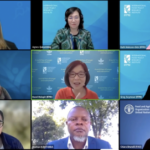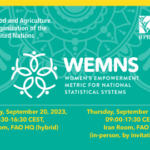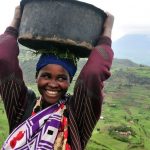The 2015 adoption of Sustainable Development Goal 5 (SDG5)—achieving women’s empowerment and gender equality—prompted a growth in metrics to monitor global progress toward this goal. With the February 22 launch of the Women’s Empowerment Metric for National Statistical Systems (WEMNS), IFPRI Director General Johan Swinnen noted, “we are seeing a major step in the long-running strategy to come up […]
Women’s Empowerment Metric for National Statistical Systems (WEMNS)
Women's Empwoerment Metric for National Statistical Systems (WEMNS) The two-day Women’s Empowerment Metric for National Statistical Systems (WEMNS) event is the soft launch of a streamlined tool for measuring women’s empowerment, which is suitable for use by national statistical systems in large-scale, multitopic surveys. WEMNS is being developed by the International Food Policy Research Institute (IFPRI), Emory […]
Policy seminar: New pro-WEAI modules gauge women’s empowerment in nutrition and health, market inclusion
Since the Women’s Empowerment in Agriculture Index (WEAI) launched in 2012, at least 247 organizations in 59 countries have used its various versions and tools for measuring women’s empowerment and gender equity. This uptake demonstrates a growing demand for validated tools focusing on these issues across geographic contexts and livelihoods. A March 2 IFPRI policy seminar marked […]
Measuring What Matters: 10 Years of the Women’s Empowerment in Agriculture Index, why has it mattered, and what’s next?
Measuring What Matters: 10 Years of the Women’s Empowerment in Agriculture Index, why has it mattered, and what’s next? Women are key to agricultural transformation around the world, but various obstacles and economic constraints limit their contributions to their households and communities. The Women’s Empowerment in Agriculture Index (WEAI) is an innovative tool that seeks to identify […]
Launch of the pro-WEAI Distance Learning Module
So far, 99 organizations have used the Women’s Empowerment in Agriculture Index (WEAI), an innovative tool that measures progress toward gender equality and identifies obstacles to becoming empowered.Women play a vital role in rural economies, from farm labor to unpaid domestic and caregiving work. They are essential to food security and nutrition, land and natural resource management, and building resilience to climatic and other shocks.




